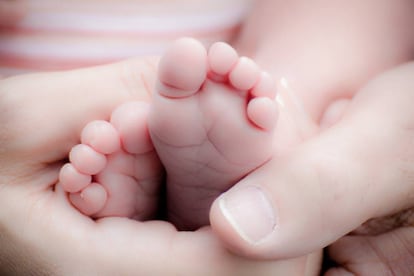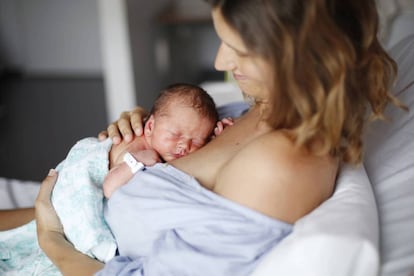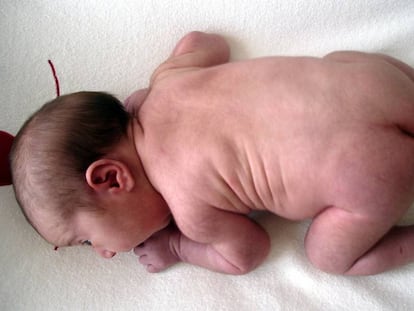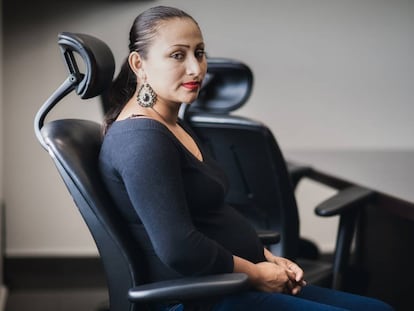Spanish region pioneers law for skin-to-skin contact between mother and newborn
Murcia is the first to make it a legal right for babies to get so-called ¡°kangaroo care¡± right after delivery


A new law will see that all babies born in the Spanish region of Murcia, whether by natural birth or cesarean section, have the right to remain with their mothers and enjoy skin-to-skin contact ¨C otherwise known as ¡°kangaroo care¡± ¨C immediately after delivery.
Although this practice had been habitual at many hospitals for years, this is the first time that it has been included in regional legislation, and advocates note that the law also gives the newborn the right to a unique clinical history from the moment of birth.
Not separating mothers from their babies after birth is an obvious biological rule
Ricardo Garc¨ªa de Le¨®n, pediatrician
The legal reform won unanimous support in the regional assembly and took just one month to become law. Murcia is the first Spanish region to turn the practice ¨C already prevalent at its main hospitals ¨C into a legal right.
¡°Not separating mothers from their babies after birth is an obvious biological rule,¡± says pediatrician Ricardo Garc¨ªa de Le¨®n, president of the association Until You Say So (HQTQ), which sponsored the reform. ¡°All mammals do it,¡± he explains. ¡°Those first hours are crucial to a newborn¡¯s ability to adapt to its new environment.¡±
According to Garc¨ªa, there is extensive scientific evidence supporting the benefits of uninterrupted contact, and not only for premature babies where kangaroo care has been shown to be the best way to prevent hospital-bred infections. The contact between mother and child also helps stabilize the baby¡¯s vital functions ¨C its body temperature and its breathing ¨C as well as stimulating breastfeeding.

¡°As mothers, we instinctively recognize the advantages, which is why we become anxious when we are separated from our baby,¡± says Clara Mar¨ªa Garc¨ªa, spokeswoman for the breastfeeding support groups in the Murcia region. ¡°To have this right recognized by law is a step in the right direction. It is, however, actually just restoring something that had been the norm throughout history, but which was lost with the introduction of health protocols regarding deliveries and intrusive measures. We went backwards and now we are catching up.¡±
In Spain overall, the chances of a mother and child being allowed to bond right after birth depend on the hospital and whether the medical team involved in the delivery is aware of its benefits, says Garc¨ªa de Le¨®n.
Concepci¨®n Mart¨ªnez, a midwife and the deputy chief of nursing at Virgen de la Arrixaca Hospital in Murcia, is excited by the new legislation. This busy center, which delivers more babies than anywhere else in the country (7,400 in 2017), has been practicing kangaroo care with natural births since 2012, and last year adopted it with planned cesareans.
Local health centers were treating newborns without any prior medical history beyond what the mother could tell them about it
Teresa Rom¨¢, Association of Healthcare Users
Mart¨ªnez recognizes that there are certain professionals who prefer to separate babies from their mothers after birth to clean, dress and examine them. But, she adds, a healthy baby does not need this kind of attention. ¡°The law means that all professionals will have to respect [skin-to-skin contact], and that the protocol indicating the medical exceptions for separating a baby from the mother is clear,¡± she says. ¡°Midwives, nurses and pediatricians will now be questioned on their motives for separating mother and child because, if it¡¯s not justified, the family can report it.¡±
Santa Luc¨ªa hospital in Cartagena, which is the second biggest in the region, ensures that babies are not separated from their mothers if the birth is natural, with a rate of 60% in the case of C-sections. Making the practice legally official will not change much in the day-to-day running of the hospital, but Paloma Ortega, head of gynecology, is confident that it will help ensure more staff are aware of the benefits of kangaroo care and that space is allowed for it after all deliveries.
According to Jos¨¦ Ram¨®n Salcedo, president of the Biolaw, Ethics and Health Studies Center at Murcia University, moving from good clinical practices to having that practice enshrined in law is a real turning point. In Spain, both national and regional laws are generic, he says, and while they allude superficially to the kangaroo care of the newborn, none have gone into detail on the subject until now.
Salcedo also believes that introducing legislation to ensure the baby is given his or her own medical record is of great significance. ¡°The baby has until now been considered a product of the birth, not a subject in its own right and a reality apart from the mother,¡± he says, referring to attitudes that have governed policy until now.
Teresa Rom¨¢ from the Association of Healthcare Users in Murcia Region adds: ¡°There are factors during the birth that are critical to the subsequent development of the child and to his or her future health. But [in the past] we were finding that local health centers were treating newborns without any prior medical history beyond what the mother could tell them about it.¡±
Rom¨¢ insists that opening an independent medical record with details of the birth gives the baby the right to be a person in his or her own right, and not just an extension of the mother. However, she says that making the law was the easy part; far more challenging is enforcing it and making sure there is a network in place to protect the mother and baby¡¯s rights at this crucial point in their lives.
English version by Heather Galloway.
Tu suscripci¨®n se est¨¢ usando en otro dispositivo
?Quieres a?adir otro usuario a tu suscripci¨®n?
Si contin¨²as leyendo en este dispositivo, no se podr¨¢ leer en el otro.
FlechaTu suscripci¨®n se est¨¢ usando en otro dispositivo y solo puedes acceder a EL PA?S desde un dispositivo a la vez.
Si quieres compartir tu cuenta, cambia tu suscripci¨®n a la modalidad Premium, as¨ª podr¨¢s a?adir otro usuario. Cada uno acceder¨¢ con su propia cuenta de email, lo que os permitir¨¢ personalizar vuestra experiencia en EL PA?S.
?Tienes una suscripci¨®n de empresa? Accede aqu¨ª para contratar m¨¢s cuentas.
En el caso de no saber qui¨¦n est¨¢ usando tu cuenta, te recomendamos cambiar tu contrase?a aqu¨ª.
Si decides continuar compartiendo tu cuenta, este mensaje se mostrar¨¢ en tu dispositivo y en el de la otra persona que est¨¢ usando tu cuenta de forma indefinida, afectando a tu experiencia de lectura. Puedes consultar aqu¨ª los t¨¦rminos y condiciones de la suscripci¨®n digital.










































